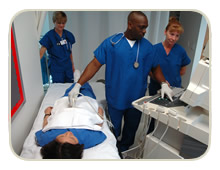For more information about our programs, please contact:
|
Front Desk: 281.290.5229 Campus: LSC-CyFair |
Diana Pena |
For program advising information, please contact:
|
Jessica Paz - FT Workforce advisor Denise Armstrong - PT Workforce Advisor Campus: LSC-CyFair |
 Diagnostic Medical, Cardiac and Vascular Sonography are imaging modalities used to evaluate the body for diagnostic purposes. Sonographers use special equipment to direct high frequency sound waves into areas of the body. Sonographers operate the equipment and collect images to be interpreted and diagnosed by a physician.
Diagnostic Medical, Cardiac and Vascular Sonography are imaging modalities used to evaluate the body for diagnostic purposes. Sonographers use special equipment to direct high frequency sound waves into areas of the body. Sonographers operate the equipment and collect images to be interpreted and diagnosed by a physician.
The Associate Degrees in Sonography are designed to prepare graduates for employment in the health industry in General and Vascular or Cardiac and Vascular Sonography profession. An Associate Degree in Applied Science is awarded at completion of the program of study. The student is also eligible to take the American Registry of Diagnostic Medial Sonographers licensing examination for Registered Sonographers (ARDMS). The Sonography programs consist of classroom, laboratory and clinical learning experiences.
Information Sessions, Requirements, and FAQs
Attendance at an information session is required as a part of the admissions process for the program. During the information sessions, we will discuss the admission process & requirements, curriculum, professional standards, career information, uniforms & supplies needed, as well as a Q&A period.
Additional information can be found on our Frequently Asked Questions page.
Technical Standards and Important Qualities
| Academic | Lab/Clinical |
|---|---|
|
|
Students must be able to carry out all assigned duties required of a practicing sonographer, such as:
- Move heavy equipment on wheels (up to approximately 500 lbs.), transport patients by wheelchair & stretcher; push, pull, bend, stoop routinely
- Work in dimly lit areas
- Stand on their feet for long periods (80%)
- Lift more than 50 lb. routinely; assist patients; lift or turn disabled patients
- Interact compassionately with patients
- Work stationary diagnostic imaging machines, and also may perform some procedures at patients' bedsides
- Maintain prolonged arm positions necessary for scanning
- Adhere to privacy regulations (HIPAA)
- Be available to work on short notice (on-call), nights & weekends (for employer)
Source: Bureau of Labor Statistics’ Occupational Outlook Handbook; Society of Diagnostic Medical Sonography